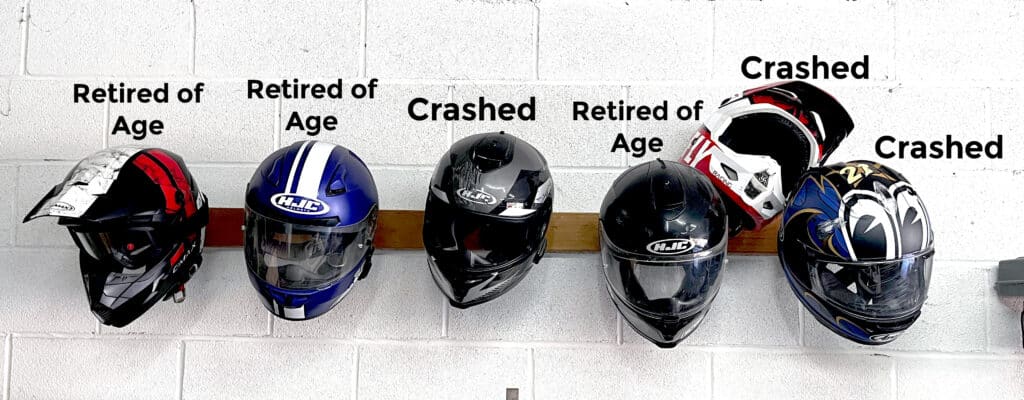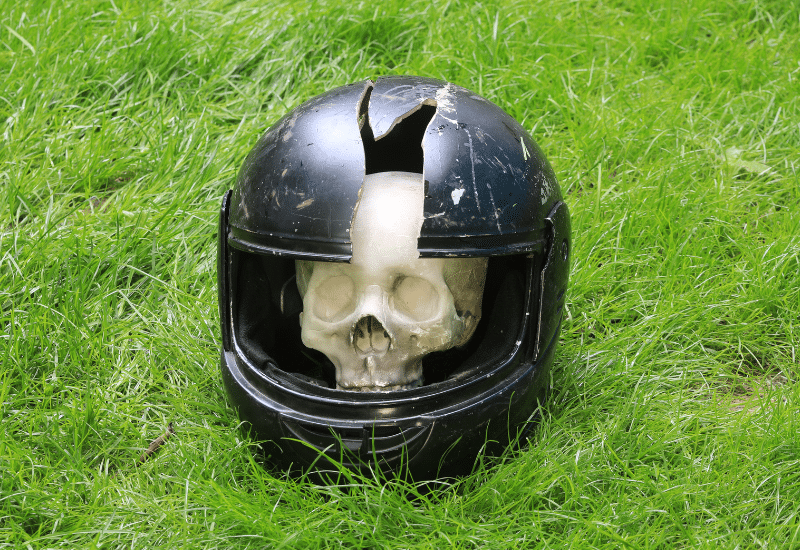Motorcycle helmet laws change yearly, and it’s a good practice to review the laws that pertain to your state. The Law Tigers reviewed the helmet laws in every state and Washington D.C. to provide you with the latest updates.
In 2021, 6,084 motorcyclists were killed, representing 14 percent of all traffic fatalities. This is the highest number killed since the Fatality Analysis Reporting System (FARS) began collecting this data in 1975. In states with universal helmet laws, 55 percent of motorcyclists killed in 2021 were not wearing helmets, compared to 9 percent in states with universal helmet laws; emphasizing the importance of wearing your motorcycle helmet.
Background on Helmet Use
According to the National Occupant Protection Use Survey (NOPUS), the only survey providing nationwide, probability-based, observed data on motorcycle helmet use in the United States, motorcycle helmet use hovered between 66.5 percent and 64.9 percent in 2022. In 2022 alone, the percentage of motorcycle riders using a DOT-compliant helmet is 66.5 percent: 24.5 percent of riders wore no helmet, with 7.4 percent of riders wearing non-DOT compliant helmets.

An interesting statistic of note focuses on helmet use among motorcycle passengers – the percentage of those using a helmet increased significantly from 2021 to 2022. Helmet use for this group increased from 76.9 percent in 2021 to 92.1 percent in 2022. Reasons for this may include:
- Safety Awareness Campaigns – increased awareness and educational campaigns about the importance of wearing helmets for motorcycle passengers may prompt more helmet wearing;
- Media Coverage of Accidents – Every day, motorcyclists are hurt or killed while riding. High-profile fatal accidents, like the one actor Treat Williams was involved in with an oncoming SUV in June of 2023, are reminders accidents can happen to anyone.
- Peer Influences/Social Norms – wearing protective gear such as a helmet becomes socially acceptable the more rider user groups, celebrities and athletes endorse their use.
Motorcyclist Alyssa Bridges always wears a helmet, even if riding a short distance. She pushes back on the crowd who says wearing a helmet takes away the freedom of riding and experiencing the “wind in their hair.”
“I’ve heard from people that helmets take away from their “freedom” and they want to feel the wind as they ride,” Bridges said. “Frankly, there are half-helmets for that need. I’ve sped past plenty of riders getting hit in the face with hail and rain, while I’m riding comfortably in a full-face helmet.”
Safety Statistics Promote Motorcycle Helmet Laws Save Lives
Do all states require helmets? Surprisingly, no. Three states do not have a helmet law: Illinois, Iowa, and New Hampshire. Eighteen states require all riders to wear a helmet, regardless of age. Bridges has always worn a helmet, and said it would feel strange not wearing one, especially when riding in inclement weather.
“I enjoy not getting pelted with bugs, weather and debris while riding,” she said. “Wearing a helmet just makes it easier at high speeds and I certainly have a few helmets to thank for saving my head.”

Bridges has kept many of her old helmets as a reminder of their “service,” including some involved in a crash, and others that were retired due to old age. And yes, helmets do have a shelf life, a discussion Bridges explores in a video she recently shot for Law Tigers.
In 2016, the latest year comprehensive data was analyzed, the NHTSA estimates motorcycle helmets saved an estimated 1,859 lives. An additional 802 lives could have been saved if all motorcyclists had worn a helmet. Of those riders involved in a fatal accident, 3,054 were known to be wearing helmets, while there were 2,089 known, unhelmeted riders involved in a fatal motorcycle crash.
An important fact uncovered by NOPUS is that while the number of fatalities in all other vehicle types has decreased over the last decade, motorcyclist fatalities have nearly doubled, consisting of 14 percent of all traffic fatalities. According to NHTSA, in 2020, motorcycle registrations make up 3.2 percent of registered vehicles in the United States, and account for only 0.6 percent of vehicle miles traveled. NHTSA also found according to vehicle miles traveled in 2020, the fatality rate for motorcyclists (31.64) was nearly 28 times the passenger car occupant fatality rate (1.15).
Age and Gender As A Factor in Motorcycle Injury and Death
NHTSA reports crashes for those ages 55-and-older accounted for 23 percent of motorcyclists killed in 2011 and increased to 27 percent in 2020. Fatality statistics paint a more dire picture: during the ten-year period from 2012 to 2022, fatalities among this age group increased by 37 percent, while those ages 65 and older saw a staggering 75 percent increase in fatalities during the same period. One reason for the increase can be attributed to the “greying” of society: according to Census.gov, in 2020, 1 in 6 people in the United States was older than 65, accounting for a 16.8 percent of the U.S. population, or 55.8 million individuals. The number can also anecdotally be attributed to the attitudes and values of this population segment. Those in this age group have more disposable income to purchase items such as motorcycles, and generally view living life with a strong bent towards independence and freedom to do as they choose.
Gender is a huge factor in motorcycle fatalities as well. According to the Insurance Institute for Highway Safety Fact Sheet on Motorcycles and ATVs, in 2020, men accounted for 92 percent of motorcycle deaths, with 5,112 men losing their lives, while only 8 percent or 460 women did so. Additionally:
- In 99 percent of male motorcycle deaths, they are the rider
- In 61 percent of female motorcycle deaths, they are the passenger
Bridges says in her experience, older motorcyclists are usually the ones to balk at helmet use and even in the face of safety statistics, still shun wearing protective headgear. She noted those who routinely wear a helmet can make an error in judgment, hopping on a bike for a “quick ride,” only to find themselves the victim of a horrific accident.
“I lost a friend in a quick instant when they didn’t wear a helmet,” Bridges recalls. “The friend just for a moment hopped on the back of someone else’s bike for a quick ride to camp. They hit a rock patch and he managed to hit the ‘perfect’ spot on his head with a rock. He was actually a very seasoned rider but made one quick mistake.”
Forbes Magazine, in an article published in 2023 on motorcycle accident statistics, found helmet use has decreased by six percent since 2000. That year 71 percent of riders wore a helmet, while only 65 percent did so in 2020. They also reported that the state with the most motorcycle accidents was New Hampshire, where 25 percent of all deadly accidents in the state involved motorcyclists. It is also one of three states without a helmet law.
Motorcycle Safety Advocacy Groups Promote Helmet Use
Riding safely and avoiding accidents are a top priority of any motorcyclist. Groups such as the Skilled Motorcyclist Association – Responsible, Trained and Educated Riders (SMARTER), focus on education, research and information to make the point that helmet use saves lives. This non-profit is comprised of riders, trainers, policy makers, educators, legislators, litigators and families, all with a common goal: offer life-saving information and training. And most states now require riders to take a motorcycle safety course through The Motorcycle Safety Foundation, who has developed extensive training materials for both the novice and experienced rider. This training may help riders understand the importance of safety gear and education prior to climbing onto a motorcycle, and is aimed at reducing the 36 percent of riders in an accident who were not licensed with a motorcycle endorsement. But ultimately, reducing fatalities may come down to making a conscious decision to wear a helmet when riding.
Bridges reiterates helmets are clearly a choice, but also poses the question, “how much is your brain worth? Wearing a helmet just makes it easier to ride at high speeds. I certainly have a few helmets to thank for saving my head.”
Get the Compensation You Deserve and Get Back on the Road
Regardless of helmet use, a motorcyclist injured in a crash has legal rights. The Law Tigers local motorcycle accident lawyers fight on behalf of injured riders to get the compensation they deserve. For more than 20 years riders have trusted the Law Tigers to help with their case. Visit lawtigers.com or call 1-888-863-7216, 24/7 for a free case evaluation.




